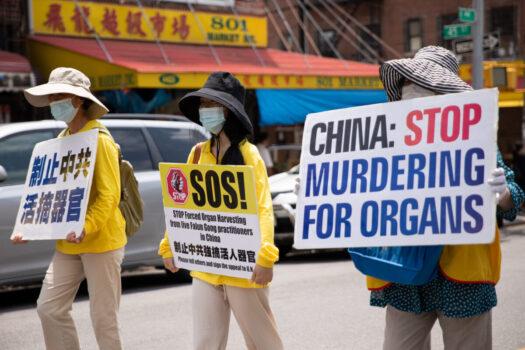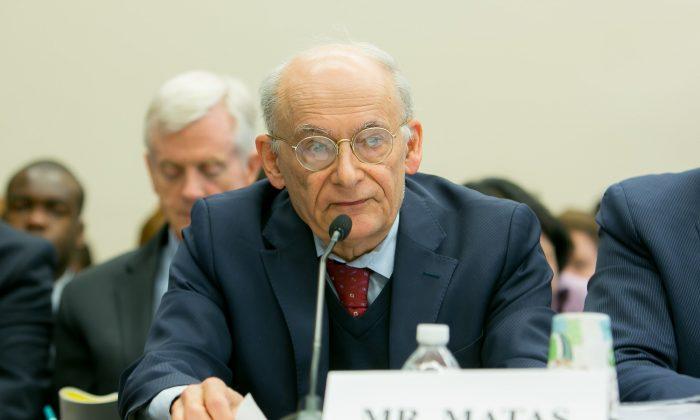The belief that downplaying Beijing’s human rights abuses would lead to reforms in China has not only validated the Chinese Communist Party’s approach against faith groups such as Falun Gong, but has also given it licence to repeat the atrocities, a paper published by the Macdonald-Laurier Institute (MLI) says.
Published by MLI on Dec. 10, the paper notes that politicians have taken the easier path when confronted with issues regarding Falun Gong.
“For diplomats seeking to advance complex and multi-faceted agendas with China, the persecution of Falun Gong is understood to be a third rail,” the authors said.
“Talk about some other forms of repression, and the Chinese Communists will offer denials and justifications. Talk about persecution of Falun Gong, and the Communists get angry and walk out of the room.”
“Given the risks, it seems much simpler and more productive to simply focus on other things,” they added.
Arthur Waldron, professor of Chinese history at the University of Pennsylvania, as cited in the paper, observed that Beijing places Falun Gong right at the top of its persecution targets.
They reasoned that even though the diplomatic boycott is meant to demonstrate the Canadian government’s displeasure with China’s human rights violations, particularly against the minority Uyghur Muslims in Xinjiang, it has come “too late.”
“Those who argued that we must not participate in Beijing’s ‘genocide Olympics’ forget something crucial: we already have,” they wrote.
“The 2008 Beijing Summer Olympics also took place against a backdrop of mass atrocities. The success of those games, and the muted response of the international community to the human rights abuses surrounding them, was understood by Beijing as a validation of its approach, and as licence to repeat it.”
“This occurred sometimes within walking distance of Olympic venues and major landmarks,” the paper said.
“In prisons, forced labour camps, and reeducation centres, they are subjected to high-pressure tactics to forcibly ‘transform’ their minds, including beatings, sleep deprivation, sexual humiliation and rape, suspension in stress positions, shocks with electric batons, and injections with unknown psychotropic drugs,” the authors said.

The reason the CCP wants to “completely eradicate” Falun Gong is because it cannot tolerate any belief incompatible with its communist, atheist ideology, the authors argued.
“Religious faith is a threat to totalitarians everywhere, because they cannot countenance the idea that any authority—especially a divine authority—stands above their own,” Matas and Ford said.
“There can be no loyalty except loyalty to the party, no meaning except that which is prescribed by the party, no truth that cannot be altered by fiat or force.”
“This fact explains not only why the Communist Party sought to destroy Falun Gong, but also why it suppresses Tibetan Buddhists, Uyghur Muslims, faithful Catholics, and members of underground Protestant churches,” they added.
Yet most Canadians know little to nothing about the repression of Falun Gong in China, Matas and Ford said, adding that political leaders in Canada seldom acknowledge it.
Besides politicians, the paper noted some Canadian and U.S. media outlets have reportedly “spiked or censored stories” about the persecution campaign, possibly due to pressure from the Chinese regime.
“Broadly speaking, it seems that media can hardly touch this story if they want to continue to operate in China,” the paper read. Chinese scholars are also at risk of being denied a visa into China if they write about Falun Gong in a way not approved by the communist state.
The authors attribute another reason to the obscurity of the group’s name and its adherents when the persecution started.
“At the time that the suppression in China began, the group was virtually unknown in the West. They had not acquired significant social capital, had few networks or connections, and there were no natural constituencies to whom they could appeal for support,” the authors said.
They added that due to the language and cultural barriers faced by the Falun Gong adherents, and the lack of a proper mechanism to mount an effective public awareness campaign, many people didn’t know what the practice was about and the atrocities that were happening in China.
There are also those who aren’t willing to “confront the reality” that such a large-scale persecution exists in today’s society.
“Despite the depths of depravity seen in the Holocaust, there remains still a naive belief that these sorts of atrocities—the mass industrialized killing by an advanced society of a group of innocent people—cannot happen,” Matas and Ford wrote.
The authors stressed that, whether it is the persecution of Uyghur Muslims or faithful Christians, it is carried out by “many of the same people, with the same tactics, that the Falun Gong have endured for decades.”
“Those who ignored the brutal repression of Falun Gong for decades cannot now claim to be surprised,” they said.





